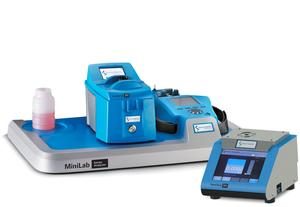Highlights
The MiniLab 33 provides oil condition information including viscosity,chemistry,water and total ferrous wear measurement of normal and abnormal ferrous wear.
ON-SITE OIL ANALYSIS SYSTEM FOR INDUSTRIAL MACHINERY
Oil analysis provides early indications of equipment wear and identifies the root causes of corrosion. On-site oil analysis eliminates the wait associated with sending samples off-site and enables immediate decision making.
With three simple tests, the MiniLab 33 delivers on-site oil analysis, providing immediate actionable results, saving time and reducing costs. Highlights of this system include:
- One product, delivering lab-quality analysis outside of the lab
- Simplified workflow for the non-expert user, no chemist required
- Simplified data handling and report interpretation via OilView and Trivector reporting
Trivector™ – oil and machine health simplified

The MiniLab 33 combines three simple tests that take less than 7 minutes to complete
(Click on any three tests images below to watch how-to videos)
|
|
 |
|
 |
| Parameter | Ferrous ASTM Method D8120 |
Viscosity ASTM Method D8092 |
Chemical ASTM Method D7889 |
|
| Contamination | Particle count and ISO codes | |||
| Non-metallic particle count, distribution and images | ||||
| Boron, Calcium, Sodium, Lithium, Potassium and Silicon | ||||
| Water | V | |||
| Chemistry | Viscosity | V | ||
| Total Acid Number (TAN) | V | |||
| Oxidation | V | |||
| Total Base Number (TBN), Oxidation, Nitration, and Sulfation for engine oils | V | |||
| Boron, Magnesium, Calcium, Barium, Zinc, Molybdenum, and Phosphorus | ||||
| Wear | Wear particle images, counts and distribution | |||
| Total Ferrous content, ppm | V | |||
| Ferrous particle count and size distribution | ||||
| Copper, Silver, Chromium, Titanium, Aluminum, Magnesium, Nickel, Iron, Manganese, Lead, Tin, Molybdenum, Cadmium, and Vanadium |
OilView™ LIMS asset management software

Target Industries
The MiniLab 33 is ideal for a wide range of industries such as:
Typical limits for machinery
The most common oil analysis tests and typical alarm limits for several component types are shown below. Component manufacturers establish alarm limits for their equipment for specified parameters.


.jpg)
